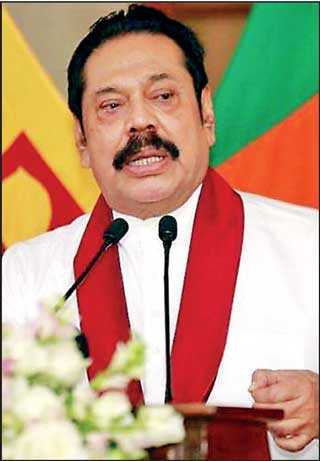Tuesday Feb 24, 2026
Tuesday Feb 24, 2026
Wednesday, 4 September 2019 00:00 - - {{hitsCtrl.values.hits}}
By Ashwin Hemmathagama – Our Lobby Correspondent
Opposition Leader Mahinda Rajapaksa drawing the Speaker’s attention to the People’s Bank (Amendment) Bill cautioned the Government to reconsider it given the seriousness of the proposed changes, and to delay the Parliament debate scheduled to be moved today.
 |
Opposition Leader Mahinda Rajapaksa |
MP Rajapaksa in a letter addressed to Speaker Karu Jayasuriya, held the People’s Bank (Amendment) Bill is widely discussed among the banking sector and the employees as causing a direct impact on the stability of People’s Bank. He also requested the Speaker to consult the party leaders and assign a new date for the People’s Bank (Amendment) Bill debate.
The Government moved the People’s Bank (Amendment) Bill on 22 August in Parliament seeking House approval to allow the bank to increase the authorised capital and to raise sums up to Rs. 50 billion as authorised capital.
Justifying the Amendment Bill, the Government predicts unless stability is increased none of the state banks including the People’s Bank will continue to hold its current market share of 45% due to increased competition in the banking sector in the years to come.
Assuring the nation, the Bill is not an attempt to privatise the People’s Bank, which has assets worth Rs. 1.75 trillion, 7,900 employees in 737 branches serving over 10 million customers enabling the Government to collect Rs.140 million as dividends during the last 10 years, State Minister of Finance Eran Wickramaratne moved the bill.
“Capital is necessary for a bank to grow and to be stable. According to BASEL regulations, there are international capital requirements. The bank met the minimums requirements regardless of the Government in power. But meeting the minimum requirement is not enough for the development of a bank. Prior to 1978, there were a few foreign banks in Sri Lanka. Mostly they were the foreign banks established during the British colonial era in Sri Lanka. These banks had a large market share. Today, many are using banks and the local banks have lost market share. If continued the local banks will continue to lose the market share and end-up in the 35%-25% range in another 10 years. Ultimately will end very low in twenty years,” he said.
“Ownership alone will not help the banks against the market share. The Bank of Ceylon and the People’s Bank are at the forefront in terms of service and technology. The private sector local banks will exceed the State banks unless we increase the capital of the State banks,” he added.
According to the Government, the Bill will provide some autonomy and independent decision-making ability to the People’s Bank.
